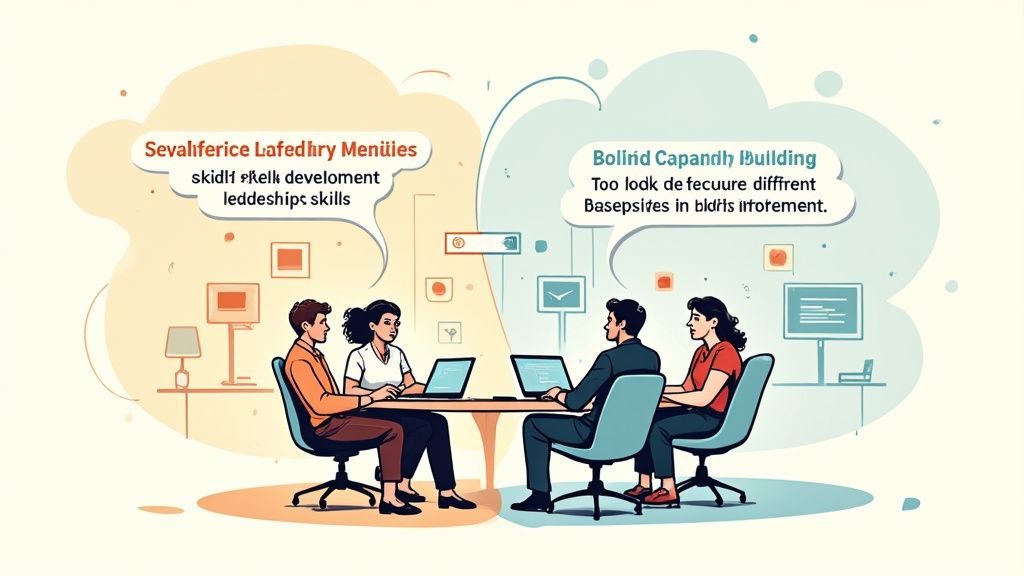Coaching and Mentoring Differences: 8 Key Distinctions


Coaching vs. Mentoring: Understanding the Differences
Personal and professional development often involves finding the right guidance. Two key approaches - coaching and mentoring - each provide unique pathways to growth. While these terms are frequently used interchangeably, they serve different purposes and work best in specific situations.
The concept of guided development has deep historical roots, from ancient philosophical teachings to modern professional development methods. At its core is the fundamental goal of helping individuals reach their full potential through personalized support and guidance.
This guide breaks down the key differences between coaching and mentoring, helping you understand:
- How each approach works
- The unique benefits they offer
- When to use each method
- How to choose the right option for your needs
By understanding these distinct approaches, you'll be better equipped to select the development path that best matches your personal or professional goals. Let's explore how coaching and mentoring can support your journey toward success.
1. Duration and Scope
Coaching and mentoring serve different purposes based on how long they last and what they cover. Understanding these core differences helps organizations and individuals choose the right development approach for their needs.

Coaching typically spans 3-6 months and zeros in on specific skills or objectives. It works like a focused program to tackle particular challenges. For instance, a manager might work with a coach for 3 months to strengthen their public speaking abilities or guide their team through major changes. This shorter timeframe helps create measurable progress quickly.
Mentoring builds a deeper connection that often extends beyond one year, covering broader career and personal growth. Many companies run formal mentoring programs where experienced leaders guide junior staff members over several years. This extended relationship allows for comprehensive professional development.
The different approaches of coaching and mentoring each offer distinct benefits:
Key Advantages:
- Clear time commitments: Both parties know upfront how long to dedicate to the relationship
- Better resource planning: Organizations can effectively budget time and money for development programs
- Well-defined objectives: The scope helps set practical goals within the given period
Some potential drawbacks to consider:
Challenges:
- Limited flexibility: Some situations need more adaptable timelines, especially in mentoring where organic growth matters
- Relationship depth: Shorter coaching engagements may restrict how strong the connection becomes
Both coaching and mentoring have gained recognition as key tools for ongoing learning and growth. While coaching targets immediate needs, mentoring provides extended guidance for long-term development.
Tips for Success:
- Set clear boundaries: Define the timeline and focus areas when starting
- Check progress regularly: Be ready to adjust the approach based on changing needs
- Match the method to your goals: Pick coaching or mentoring based on what you want to achieve
Understanding these timing and scope differences helps create more effective development partnerships. When organizations and individuals know what to expect from each approach, they can better plan their growth journey.
2. Relationship Dynamic
The way coaches and mentors interact with their clients fundamentally shapes the development process. The relationship dynamic between the parties plays a key role in determining how effectively someone can grow and learn.

In coaching, the relationship tends to be more structured and businesslike. Like any professional service, it involves clear agreements about goals, schedules, and boundaries. The International Coach Federation has established standards that guide these relationships. A coach works with their client through planned sessions with specific objectives and ways to track progress. For instance, when working on leadership development, a coach and client will outline exactly what skills to focus on and how to measure improvement.
Mentoring takes a more relaxed approach that develops naturally over time. Often, it grows out of an existing connection - perhaps between experienced and junior colleagues. Organizations like the MENTOR National Mentoring Partnership help facilitate these relationships. Mentors share their knowledge and experiences in a way that fits the mentee's needs. A senior leader might mentor a new employee through regular coffee chats, offering career guidance and making helpful introductions.
Key Characteristics:
- Coaching Structure: Clear goals, regular meetings, defined outcomes
- Mentoring Flow: Natural development, flexible timing, evolving focus
- Power Dynamic: Coaches maintain equal footing while mentors often have more seniority
Benefits:
- Coaching: Professional boundaries keep the focus on results
- Mentoring: Strong personal bonds enable deeper learning
Challenges:
- Coaching: Formal structure may limit some types of sharing
- Mentoring: Less structure can make it hard to stay on track
Tips for Success:
- For Coaches: Set clear expectations while building trust
- For Mentors: Share freely but let mentees chart their own course
- For Clients: Take initiative in stating your needs and goals
The relationship dynamic matters because it helps people choose the right development path. Understanding whether you need a structured coaching relationship or a more fluid mentoring connection can make all the difference in reaching your goals.
3. Expertise Requirements
The key difference between coaching and mentoring lies in the expertise each role demands. Understanding these unique requirements helps both those seeking guidance and those wanting to become coaches or mentors. While both roles support personal growth, they do so through distinct knowledge bases.
Coaching focuses on process mastery. Coaches excel at guiding self-discovery, goal-setting, and creating action plans. Their expertise lies in managing change and growth, rather than necessarily being experts in their client's field. Consider a professional sports coach - they may not have competed at an elite level, but they understand training methods, strategy, and team dynamics. This allows coaches to work effectively with clients from many backgrounds using proven approaches. Following the model of leading coaches like Tony Robbins, they help clients discover their own solutions through structured reflection and action.
Mentoring requires deep domain knowledge. Mentors use their extensive experience in a specific industry to guide mentees. For example, a technology mentor shares insights about coding practices, workplace dynamics, or startup funding based on their own career path. This targeted guidance, exemplified by experts like Marshall Goldsmith, gives mentees practical industry advice that can speed up their professional development.
Key Differences:
- Training Requirements: Coaches typically need specific certifications in coaching methods. Mentors rely more on proven experience than formal credentials.
- Experience Needed: Coaches focus on mastering coaching frameworks, while mentors need significant success in their field.
- Skill Focus: Coaching develops broad skills useful across life areas, while mentoring provides specific knowledge for a particular field.
Benefits:
- Industry Knowledge: Mentors offer direct access to field-specific insights
- Core Skills: Coaches help build fundamental abilities like goal-setting and communication
Challenges:
- Finding Experts: Locating mentors with both expertise and teaching ability can be difficult. Similarly, finding a compatible coach takes time.
- Limited Scope: A mentor's knowledge may be too specialized, potentially limiting broader career exploration
Practical Advice: Consider your goals carefully. For general skill development or career changes, coaching may work best. For specialized field knowledge, seek a mentor with relevant experience.
Understanding these different expertise requirements helps explain how coaching and mentoring serve distinct purposes. By knowing what each approach offers, you can choose the guidance that best matches your needs and goals.
4. Goal Setting Approach
How goals are set and pursued marks a key difference between coaching and mentoring. This difference impacts how the relationship progresses and succeeds. Let's explore the distinct approaches each role takes to goal setting.

Coaching focuses on concrete, measurable objectives using the SMART framework (Specific, Measurable, Achievable, Relevant, Time-bound). A sales coach might help set a goal to increase conversions by 15% in one quarter. The emphasis stays on improving specific skills with clear metrics.
Mentoring takes a broader view centered on long-term development. Goals often relate to career growth, leadership abilities, and professional relationships. While these goals matter deeply, they're harder to measure in numbers. Success comes through gradual progress over time.
The measurement methods reflect these differences. Coaching tracks concrete data like sales figures and project metrics. Mentoring looks at qualitative changes in behavior, confidence levels, and career advancement. Coaching typically spans weeks or months, while mentoring relationships often continue for years.
Examples:
- A coach helps a salesperson boost closing rates through weekly technique practice and progress tracking
- A mentor guides a junior employee in mapping their career path and building key relationships
Best Practices:
- For Coaching: Set clear metrics, review regularly, celebrate wins
- For Mentoring: Stay flexible as goals evolve, focus on relationship-building
- Both: Document progress and conduct regular check-ins
This distinction in goal setting shapes the entire partnership between coach/mentor and client/mentee. Understanding it helps both sides choose the right approach and set appropriate expectations. Clear alignment on goals prevents frustration and creates the conditions for real progress.
"5. Feedback Methods: A Core Distinction Between Coaching and Mentoring":
5. Feedback Methods: A Core Distinction Between Coaching and Mentoring
Feedback shapes both coaching and mentoring relationships, but each approach delivers it quite differently. Understanding these differences helps coaches and mentors maximize their impact and guides individuals seeking growth to choose the right development path.
Coaching feedback is immediate, specific, and action-focused, targeting improvements in particular skills. Coaches use structured frameworks and tools to drive measurable progress. In contrast, mentoring feedback is reflective and broad in scope. Mentors draw from their experience to offer guidance on career paths and personal development.
Different Evaluation Approaches
Coaches often use formal feedback tools like structured forms, performance metrics and 360-degree assessments to track progress toward specific goals. For example, a sales coach might review call recordings and provide targeted feedback on communication skills and closing techniques. Mentors take a more casual approach through open discussions and sharing experiences. A senior manager mentoring a junior employee might naturally weave feedback into conversations about company culture and career planning.
Recent Changes in Feedback Methods
Performance management has become increasingly data-driven, leading coaches to adopt more structured feedback tools like 360-degree assessments. At the same time, rapid workplace changes have increased demand for mentorship focused on adaptability, resilience and long-term career guidance.
Tips for Effective Feedback
For Coaches:
- Use structured feedback forms and checklists
- Record and analyze performance data
- Schedule regular check-ins
- Document progress carefully
For Mentors:
- Listen actively to understand challenges
- Share relevant personal stories
- Encourage self-reflection
- Check in informally but consistently
Key Differences in Feedback Approaches
| Feature | Coaching Feedback | Mentoring Feedback |
|---|---|---|
| Pros | Specific, actionable, measurable, enables quick improvement | Big picture view, experience-based, supports long-term growth |
| Cons | Can feel overly structured, may miss underlying issues | More subjective, harder to measure, depends on mentor availability |
Understanding these distinct feedback styles helps coaches and mentors better serve their clients, while individuals can choose the approach that best fits their development needs.
6. Skills Development Focus

When it comes to developing skills and capabilities, coaching and mentoring take distinctly different approaches. Understanding these differences is key to choosing the right development path for your needs.
Coaching zeros in on specific skills that need improvement. Like a basketball coach working with a player to perfect their free throws, workplace coaching targets particular competencies such as presentation skills or conflict resolution. The approach is structured, with clear goals and measurable outcomes.
Mentoring takes a broader view, focusing on overall professional growth. Rather than drilling down on individual skills, mentors help guide career choices, expand professional networks, and build resilience. The learning happens organically through shared experiences and wisdom.
The way progress is tracked also differs between these approaches. Coaching relies on concrete metrics like performance scores and completion rates. Mentoring looks at softer indicators like improved decision-making and greater self-awareness.
Key Benefits:
- Coaching: Quick wins and visible progress in targeted skill areas
- Mentoring: Well-rounded development across multiple aspects of professional growth
Potential Drawbacks:
- Coaching: May miss important context by focusing too narrowly
- Mentoring: Progress tends to be gradual and harder to measure
Real Examples:
- A sales team receives focused coaching on negotiation techniques, leading to a measurable increase in deal closures
- A new graduate works with a mentor to navigate office dynamics and career planning, gaining confidence and direction over time
History and Growth:
Both coaching and mentoring have gained significant traction as organizations recognize their value. Coaching has proven effective for performance improvement, while mentoring helps build strong leadership pipelines and learning cultures.
Practical Implementation Tips:
- For Coaches: Set clear skill targets, track progress metrics, give regular feedback
- For Mentors: Build trust, listen actively, share relevant experiences generously
Understanding these different approaches to skills development helps individuals and organizations choose the path that best fits their goals and needs.
7. Meeting Structure: A Key Difference Between Coaching and Mentoring
The way coaching and mentoring sessions are organized reveals fundamental differences between these two developmental approaches. Understanding these structural variations helps both participants and practitioners create more effective relationships.
Formal vs. Flexible:
Coaching sessions follow a structured format with clear agendas and goals, similar to business meetings. This helps clients stay focused on specific objectives while the coach guides progress. In contrast, mentoring meetings flow more naturally - while there may be general topics to cover, conversations develop organically based on the mentee's needs and the mentor's relevant experiences.
Frequency and Duration:
The timing patterns differ markedly between these approaches. Coaching typically involves 60-90 minute sessions held weekly or bi-weekly, providing consistent accountability. Mentoring tends to occur less frequently - often monthly or quarterly - with flexible durations ranging from brief check-ins to in-depth conversations. For example, a coaching session might zero in on improving specific presentation skills, while a mentoring meeting could explore broader career direction.
Development Over Time:
Coaching emerged as a professional field by incorporating elements from business consulting and performance improvement. The structured approach helps demonstrate clear progress and results. Mentoring's origins in apprenticeship and traditional guidance led to its more adaptable style focused on relationship-building and wisdom-sharing.
Best Practices for Implementation:
For Coaching:
- Create detailed session agendas
- Set consistent weekly or bi-weekly meetings
- Document key points and action items
- Follow up between sessions
For Mentoring:
- Schedule regular but flexible check-ins
- Allow natural topic flow while having general themes ready
- Record important insights and agreements
- Keep communication channels open
Real World Example: Consider a junior marketing executive working with both a coach and mentor. Her coach helps polish presentation skills through structured practice sessions with specific feedback. Meanwhile, her mentor, a senior leader, shares broad career insights and organizational wisdom through informal conversations.
Why Structure Matters: Clear understanding of these structural differences helps people select the right development approach for their needs. It also enables coaches and mentors to design effective interactions aligned with their role. By appreciating both structured and flexible formats, individuals can get maximum benefit from coaching and mentoring relationships.
8. ROI Measurement: Gauging the Impact of Coaching and Mentoring
Understanding how to measure return on investment (ROI) is essential for showing the real value of any professional development program. Coaching and mentoring each require distinct approaches to measuring success. Knowing these differences helps create better programs and gain support from key stakeholders.
Coaching focuses on measurable results through clear metrics and data. Success indicators often include improved KPIs like higher sales numbers, faster project completion, or better customer satisfaction scores. A sales team receiving coaching might show concrete improvements like larger average deals or shorter sales cycles.
Mentoring takes a qualitative approach since it aims for long-term professional growth. Key measures include better communication abilities, stronger leadership skills, and increased job satisfaction. Programs typically use surveys, interviews and comprehensive feedback to assess these skills. For example, mentees might report feeling more confident leading meetings or better able to work through organizational challenges.
The timing of assessment also differs between the two approaches. Coaching results can often be measured in the short term, matching specific program goals. Mentoring requires a longer view - tracking career growth, promotions, and leadership roles over time shows the full impact of the relationship.
Key Differences in Measurement:
- Coaching Benefits:
- Clear data makes it easier to justify the investment
- Some valuable improvements like better self-awareness are harder to quantify
- Mentoring Benefits:
- Shows meaningful long-term impact
- Keeping track of participants over time can be challenging
- Hard to isolate mentoring as the sole cause of improvements
Effective Measurement Methods:
- Performance tracking: Monitor sales data, customer retention, project timelines for coaching
- Career progress: Follow promotions, new roles, salary growth for mentoring participants
Best Practices for ROI Assessment:
- Define clear metrics: Set SMART goals before starting any program
- Use multiple measures: Include both hard data and qualitative feedback
- Review regularly: Check progress often to stay on track and make improvements
- Get participant input: Use surveys and interviews to understand the real impact
Understanding ROI measurement is crucial for getting continued support for development programs. By using the right mix of metrics and tracking methods, organizations can clearly show the value of their coaching and mentoring initiatives while making them even more effective over time.
8-Point Coaching & Mentoring Comparison
| Concept | Implementation Complexity (🔄) | Resource Requirements (⚡) | Expected Outcomes (📊) | Ideal Use Cases (💡) | Key Advantages (⭐) |
|---|---|---|---|---|---|
| Duration and Scope | Moderate process: defined, short-term coaching vs evolving long-term mentoring | Defined allocation: set budgets/time for short-term vs extended commitment | Specific skill gains; measurable objectives | Task-focused coaching; career-focused mentoring | Clear expectations; targeted development |
| Relationship Dynamic | Structured coaching vs flexible mentoring approach | Professional framework needed for formal coaching; organic for mentoring | Defined progress with boundaries; deeper relational growth | Performance coaching; career guidance relationships | Clear roles in coaching; trust-building in mentoring |
| Expertise Requirements | Specialized: process expertise in coaching vs industry/domain expertise in mentoring | Investment in certifications and training varies | Enhanced competence and tailored industry insights | Skill-honing in professional sports/tech or industry mentoring | Focused, expert guidance |
| Goal Setting Approach | Structured SMART goals in coaching vs flexible, broad goals in mentoring | Regular progress reviews and documentation are required | Measurable performance improvement; ongoing objective refinement | Quantitative performance coaching; qualitative career development | Clear, documented objectives; flexible adjustments |
| Feedback Methods | Immediate, structured feedback in coaching vs reflective feedback in mentoring | Requires established feedback tools, evaluations, and regular check-ins | Quick adjustments and long-term developmental insights | Continuous improvement environments; performance review sessions | Timely corrections; thoughtful insights |
| Skills Development Focus | Targets specific competency improvements in coaching vs comprehensive growth in mentoring | Short-term, intensive training programs vs sustained, gradual development investments | Rapid skill uplift vs holistic capability building | Leadership coaching; career path mentoring | Focused skill enhancement and broad developmental growth |
| Meeting Structure | Formal, agenda-driven coaching sessions vs informal, flexible mentoring meetings | Needs scheduled frameworks, documentation tools, and regular follow-up | Consistent session outputs and documented progress | Weekly coaching sessions; monthly mentoring check-ins | Predictable structure with clear follow-ups |
| ROI Measurement | Quantitative metrics in coaching vs qualitative measures in mentoring | Investment in tracking systems and long-term monitoring tools | Tangible performance improvements and qualitative career impact | Corporate performance programs; long-term developmental program evaluations | Transparent metrics; comprehensive impact overview |
Choosing the Right Path: Coaching or Mentoring?
Understanding the key differences between coaching and mentoring empowers you to make the best choice for your development needs. The main factors to consider include how long the relationship lasts, interaction dynamics, expertise needed, goal-setting methods, feedback styles, skill focus areas, meeting formats, and measuring success. Both approaches offer meaningful support - the key is matching the right one to your goals.
Here's what distinguishes these two development paths: Coaching delivers structured, short-term support focused on building specific skills and improving performance through collaborative goal-setting and feedback. In contrast, mentoring provides extended guidance centered on overall career growth, with mentors sharing their personal experiences and insights. Your choice depends on your current needs - are you looking to strengthen particular abilities, tackle performance challenges, or navigate career transitions?
For both coaches and mentors, continuous learning is vital. Staying current with new approaches, industry shifts, and proven practices enhances effectiveness. Key development activities include attending professional workshops, participating in practitioner communities, and expanding skills through ongoing education. The field continues advancing with more virtual coaching platforms and personalized learning tools becoming available.
Both coaching and mentoring have clear benefits: Coaching excels at focused skill-building and performance enhancement, while mentoring provides comprehensive career guidance and advocacy. By carefully evaluating your individual needs, you can best utilize these valuable development approaches.
Want to grow your coaching abilities and explore professional development further? Coaching Hub offers a dynamic blog focused on empowering coaches, aspiring coaches, and growth-minded individuals. You'll find practical insights, proven techniques, and inspiring stories to strengthen your coaching practice and personal growth. Visit Coaching Hub today to unlock your full potential.